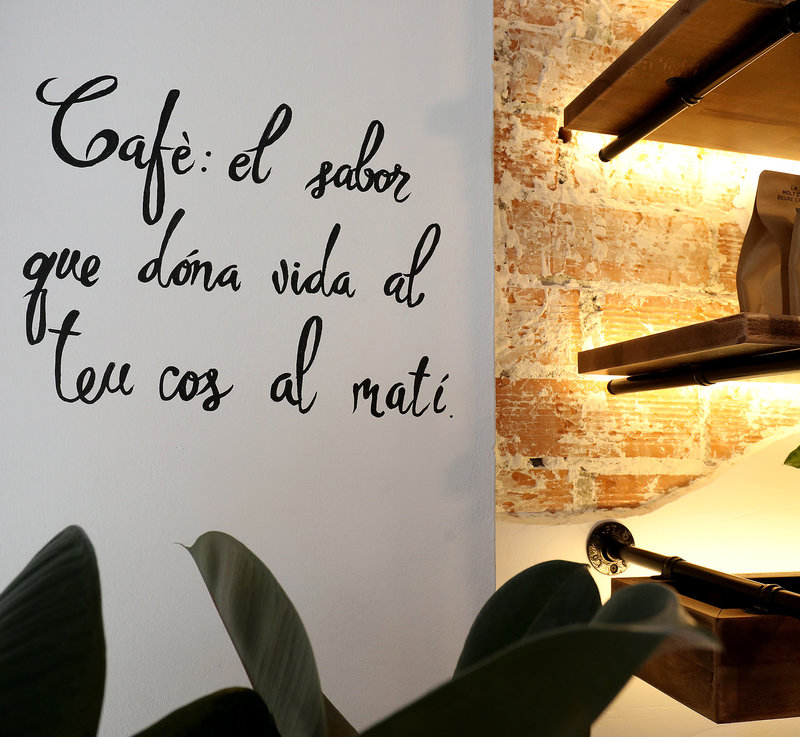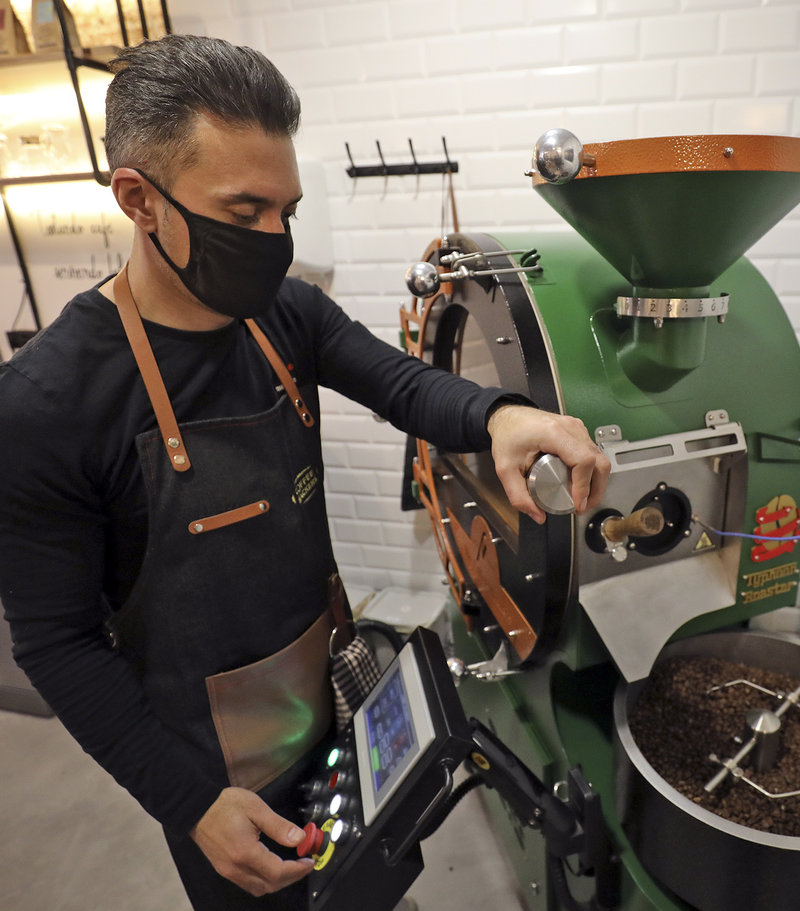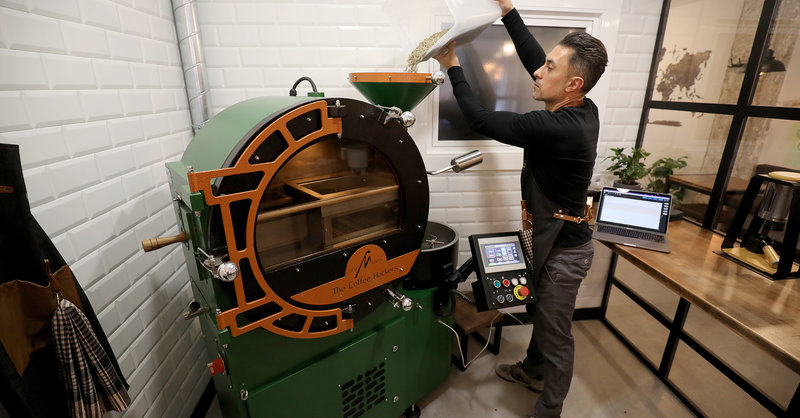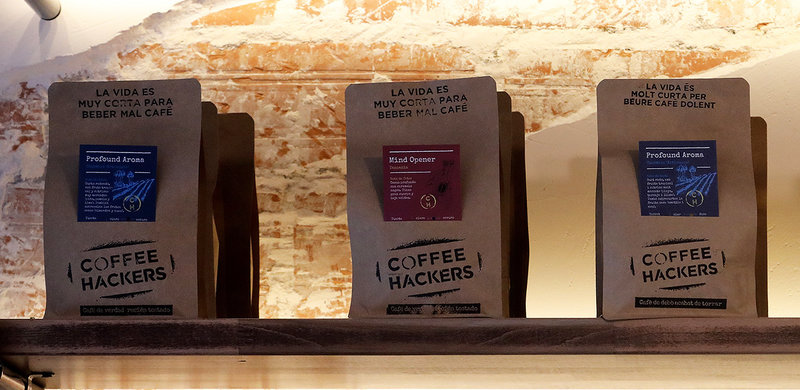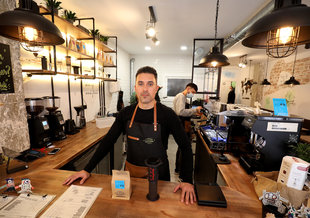Coffee Hackers
(BARCELONA)
A coffee purist
I met Carlos Valderrama for an interview that we’d scheduled to take 45 minutes, and I ended up leaving two hours later… partly because he is such a fascinating guy, partly because what he has to say about the coffee business and industry in general is so compelling, and partly, of course, because of the coffee buzz.
My initial plan was to ask him about his own connection to the world of coffee and what led him to set up this intriguing new business in the heart of Barcelona’s Sant Gervasi neighbourhood, but before I knew it, he was giving me a thoughtful and detailed analysis of the problems with our globalised modern lifestyle and how he is trying to help change that by revolutionising the way in which we perceive this most common of daily beverages. And his enlightening beliefs are not limited to how large corporations must be stopped from dominating small producers and putting them out of business with their tactics of undercutting competitors due to volume, but extend to ways of influencing the entire process of how coffee is grown, transported and consumed. It was a fascinating couple of hours, and I think I could have spent the whole day there listening to his thought-provoking reflections.
Born and raised in Colombia, Carlos has always had a great passion for coffee, witnessed in the fact that after arriving in Barcelona 20 years ago he was so disappointed at not being able to find a place that offered him the tastes he had become accustomed to that he travelled the planet to find them… coffee trips to Italy, Turkey, and then further afield to Indonesia, Vietnam, Singapore, Africa, the list of countries and regions goes on and on, Carlos’ knowledge of coffee growing with each new trip. With the passing of the years, and after marrying a Catalan and settling here, he still could not find what he was looking for in his adopted home city, so he decided to purchase his own small roasting machine and start contacting local producers of specialty coffee himself in order to enquire about receiving their products at his home. Naturally, given the transportation costs involved, many of them refused, but some offered him the opportunity to receive samples free of charge, and from there he began to establish a network of small-scale specialty coffee producers keen to form alliances away from the vice-like grip of the major corporations such as Starbucks and Nestlé. In fact, these latter two had entered into a global agreement to distribute coffee by the time Carlos was doing his research, meaning they could pretty much dictate their prices to coffee farmers around the globe.
Carlos’ philosophy goes in the completely opposite direction to that of the major corporations, who mass produce coffee on a global scale and provide consumers with a standardised product while reaping profits from the hard work of coffee farmers around the planet.
This is what Carlos aimed to do when he set out on his venture: change both the way in which people perceive coffee and the way in which it is distributed and consumed. It’s a lofty goal, but one he pursues with a passion, and much of our interview is taken up with his in-depth explanations as to how this must change. He has a full time job as a cybersecurity expert, coffee being how he likes to spend his free time rather than a commercial enterprise, but above all else it is his values that shine through when he speaks of the changes he wants to help implement in the coffee industry.
What he has built here is a truly unique place, dedicated to a purist’s approach to enjoying and appreciating coffee, and above all, one where individuals are encouraged to discover their own preferences by trying out all the taste profiles and different preparation methods it has to offer.
As a brief overview, Coffee Hackers offers ten types of coffee, from nine different origins, painstakingly selected by means of a blind trial of 26 different coffees supplied by independent farmers or cooperatives, from South America to East Timor (each coffee has its own in-depth profile card printed out for customers to read). The variety of different methods for preparing coffee is truly mind-bending, and I lost count of the options available, but they include Aeropress (a US invention) for filter or immersion coffee; the ultra-modern Trinity coffee making system (also from the US); a traditional Italian espresso machine; traditional French press filter coffee; the German Chemex filter system, devised in the 1940s; the Gina system from Slovenia (for filter and immersion); cold drip, a Japanese cold brew innovation – a cold coffee extraction method made with cold water (made at 4 degrees, all others are made at 92-95 degrees); another cold brew immersion method with a special filter from Colorado in the US; then there’s shakerato coffee from Italy, which is made from cold brew and espresso-based ice in what looks like a cocktail shaker; the list goes on and on.
When I mention the temperature at which coffee is prepared, Carlos launches into another fascinating explanation, with precise figures for different methods and how this affects taste and strength. He even sells a capsule maker for coffee machines at cost price so that customers can make their own capsules using his specialty coffee. A tip I learnt from my visit: capsule machines tend to make coffee with water at around 82 degrees i.e. not hot enough to deliver the best flavour, so boil water and wait a minute before putting it through your machine to ensure you get a temperature of 90-95 degrees.
As you can tell, there is a wealth of knowledge behind everything Carlos does, and he is keen to share it with his customers. A visit to Coffee Hackers is more than just going for a coffee, and I can’t begin to do it justice in these two pages, so if you’re as into your coffee as I am, I recommend you go down and find out more for yourself.

